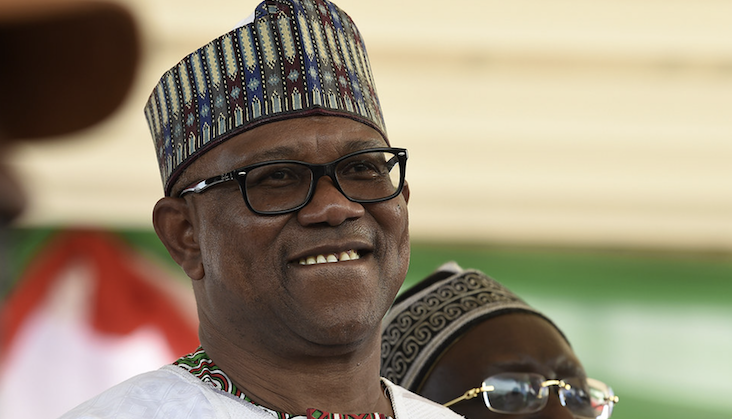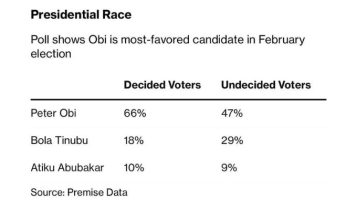
A recent poll conducted for Bloomberg by Premise Data Corp, has indicated that Former Governor of Anambra state and Nigerian businessman, Peter Obi, is the top pick for Nigeria’s next president.
The results, which were published 15 days before the elections scheduled for February 25, 2023, showed that two-thirds of respondents said they plan to vote for Obi, who is running as a third-party candidate. Despite this, both the ruling All Progressives Congress and the main opposition Peoples Democratic Party argue that Obi cannot win due to his appeal being too thinly spread across the country’s states.
Premise Data Corp has so far conducted six polls for Bloomberg, and in all Obi has maintained an unassailable lead. The Premise poll, conducted from January 26 to February 4, surveyed 2,384 Nigerians using a smartphone app and was representative of the country’s demographics.
Of the 93% of participants who said they’ve decided how to vote, 66% named Obi as their preferred choice. Obi scored a slightly higher 72% among decided respondents in an earlier Premise poll that was released by Bloomberg in September as the official election campaign kicked off.
Obi’s rise has been attributed to disenchantment with the current political climate and his campaign has gained a following known as “Obidients,” both online and at rallies.
In contrast, the two parties that have dominated Nigerian politics since 1999 finished far behind, with Bola Tinubu of the APC receiving 18% of decided voters and Atiku Abubakar of the PDP getting 10%. Despite being dismissed by his opponents as a “social media candidate,” Obi has been able to generate significant momentum in his campaign.
An ex-chairman of Lagos-listed Fidelity Bank Plc, Obi is running on the ticket of the Labour Party, whose presidential candidate garnered only 0.02% of votes in the last election four years ago.
The APC and PDP dominate both chambers of parliament, and 35 of the country’s 36 governors come from their ranks.
Structure
Despite widespread discontent with the current economic situation and increasing insecurity, Obi’s campaign has gained significant traction. However, his party, the Labour Party, lacks the nationwide organisational capabilities of the dominant parties, the APC and PDP, who have extensive experience in mobilising voters across Nigeria’s 200 million-strong population.
The practice of vote buying, which is prevalent in Nigerian elections, gives an advantage to parties with greater resources.
Furthermore the Nigerian Constitution states that a candidate who receives the most votes in the election must secure over 25% of the votes in more than two-thirds of the states to win the presidency in the first round. If no candidate meets this requirement, Nigeria will have its first runoff between the candidate with the highest overall votes and the candidate who received the most votes in the largest number of states.
The APC party claims that the Labour Party’s victory is unlikely, as their Christian candidate is unlikely to secure 25% of the votes in the predominantly Muslim north or in Tinubu’s southwestern stronghold, which includes the major commercial hub of Lagos.


Over the recent weeks, one have noticed that the “no structures” mocking by APC and PDP have reduced considerably; LP presidential candidate having proven beyond words that he’s in the race to beat both handsdown! And despite the continual down playing of the opposition, these projections could not be the figment of imagination of some pollist!